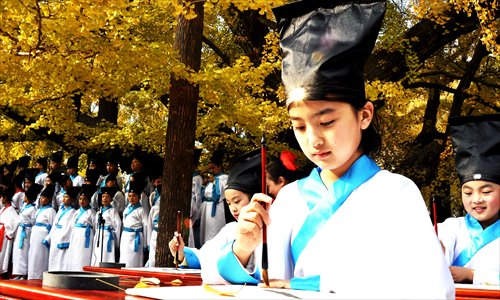HOME >> LIFE
Classic proposal
By Xu Ming Source:Global Times Published: 2015-3-9 19:58:01
Comedian Jiang Kun suggests opening traditional culture courses

Students wear traditional clothing as they practice calligraphy at the No.2 Experimental Primary School in Rizhao, Shandong Province on November 10. Photo: IC
What will be the best way to carry on traditional Chinese culture as we move further into the 21st century? This question has been on the mind of a number of CPPCC National Committee members during the ongoing two sessions, the annual meetings of China's top legislative body and top national advisory body.In an attempt to find a solution, Jiang Kun - a well-known traditional cross-talk performer and a CPPCC National Committee member, has turned to basic education, suggesting that classes in traditional culture become obligatory courses in primary schools nationwide. These courses, which would also advocate social values, could then replace current courses on moral education.
"Moral education … is like salt. When you use a little of it, your meal becomes edible or even delicious. But if you use a spoonful of it, you will find it too salty," Jiang shared his opinion on the presentation of moral education textbooks with media on Wednesday at The Beijing Convention Center, stressing the importance of finding new ways to teach traditional culture.
His proposal, which stresses taking advantage of China's abundant traditional culture to build character, is a challenge to the way moral education has been carried out in China over the past several decades.
"At present, many educators' understanding of traditional culture education is far too shallow. In many regions, they think asking students to recite the Analects of Confucius or teaching them to sing Peking Opera is all they need to do to teach traditional culture. Additionally, current textbooks and courses designed for this purpose are in a chaotic state that requires standardization and regulation," Jiang pointed out in his proposal.
To him, the imbalance between "ability" and "morality" is one of the major problems with education in China today. "It should not only provide knowledge but also build character. When it comes to the latter, traditional culture can play an important role if integrated into education, to form 'Chinese-style character education.'"
Additionally, Jiang pointed out that the content of present moral education classes in primary schools is too general and too out of date to meet the demands of basic education in today's society.
According to Jiang, current textbooks on moral education in primary schools were first put into use in 2002, and according to those he surveyed, many teachers regard the textbooks and courses as too behind the times to attract today's students, a state he called "a distressing waste of teaching resources."
Jiang, who is also director of the Chinese Ballad Singers Association, has long dedicated himself to promoting the passing on of traditional culture and art. He explained to the media Wednesday that his proposal this year is also part of his efforts to honor the last wishes of Yuan Kuocheng (1929-2015), a reputed professional storyteller who died from heart disease in Beijing on March 2.
"On his sickbed, Yuan said that his type of storytelling today is not as impressive to audiences as it once was. His stories such as the Romance of the Three Kingdoms and Liehuo Jingang used to be very influential. However, the reason his new stories have not been able to achieve this effect now is due to the lack of traditional culture education," Jiang said. "We should help fulfill his last wishes and do something to correct the embarrassing situation the inheritance of traditional culture is now in.
"What should we do? We can add a course on traditional culture, including traditional art, in primary and middle schools, to replace these out-dated textbooks and the rigid style of education."
In addition to calling on the government to implement relevant policies concerning traditional culture and moral education, he also called for relevant government organizations to establish clear teaching goals and standards in order to avoid the use of low-quality textbooks and make sure courses are established that will meet education goals.
Although his proposal goes into plenty of detail, Jiang is clear that he is a just contributor of ideas.
"We are not the decision makers. This depends on the government. It may be a long procedure and we may have to wait a long time. But it is important that we speak out about our ideas," he added.
Posted in: Miscellany